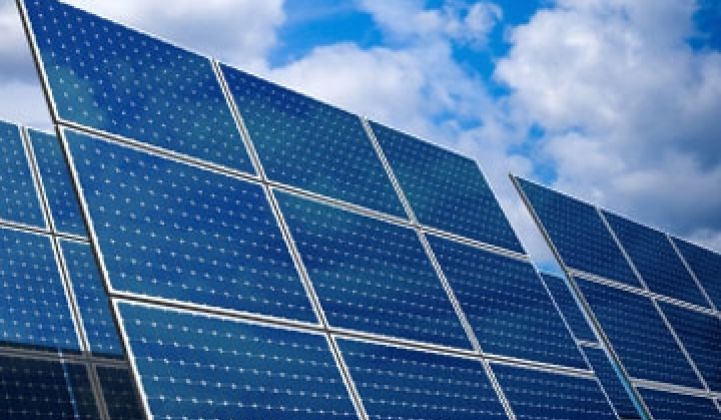It seems easy to embrace protectionism when the economy is in bad shape and competition is intense.
There is a "buy American" provision in the stimulus package passed earlier this year, for example, while China has announced a series of incentives in recent months that are meant to give domestic solar companies a big boost.
The protectionist sentiment has made its way to Europe. Solar executives in Germany have made headlines in recent weeks with their call for rules that would help them fend off companies that could offer cheaper goods, mostly from China. Dieter Ammer, CEO of Conergy, recently said the prices offered by Chinese companies "border on dumping."
SolarWorld's CEO, Frank Asbeck, has been particularly vocal. He is advocating for a "buy European" regulation for public solar projects.
Asbeck told Bloomberg last week that Germany, which remains the largest market for many solar companies thanks to its generous incentives, should only subsidize solar panels that are mostly made in Europe.
By that he meant, apparently, that it would be fine if the solar cells came from Asia but their assembly into solar panels was done in Europe.
Discontent about competing with Chinese companies has prompted some German politicians to revive talks about cutting the feed-in tariff policy, which requires utilities to buy solar power at premium rates set by the government (see Germany Solar Incentives in Jeopardy?). Proponents of the cut said the incentives have largely benefited Chinese companies instead of the domestic manufacturers, and that should change.
Protectionism goes against the idea of free market, something that many company executives would claim they support (except maybe in hard times). It also puts competitors on the defensive, prompting them to make investment and other business decisions that may not prove wise in the long term.
Sentiments such as these are emerging at time when solar companies worldwide have suffered sales declines. When the market was booming in early 2008, solar companies boosted their production. Their products then began to pile up when the financial market crashed and the solar companies' customers began to have a hard time raising money to build projects (see Solar Panel Glut Could Last Until 2012, Says Report).
Wholesale prices for solar panels have dropped significantly, reaching 50 percent in some cases. The pricing of long-term contracts for silicon (the key material for most of the solar panels made today) plummeted about 50 percent, reported New Energy Finance, a market research firm in London (see Contract Silicon Price Falls 50%, Close to Spot Price).
Meanwhile, the American Recovery and Reinvestment Act (ARRA) also contains a "buy American" provision, although it applies only to public projects funded by the act. The requirement calls for using domestically produced iron, steel and other manufactured goods.
The ARRA will be doling out millions to federal, state and local government agencies for a host of renewable energy and energy efficiency projects.
But companies could apply for a number of exemptions. The provision also wouldn't trump trade agreements already in place between the United States and other countries, so non-American goods in many cases wouldn't be affected by the rule.
"A lot of smoke, but not much fire is how I'd put it for now," said Shyam Mehta, a senior solar analyst at GTM Research, about the "buy American" rule. "You can get around it easily."
The rule won't apply to private projects. So it won't impact the many developers who have applied for billions of dollars in loan guarantees for photovoltaic and solar thermal power plants in the desert of California, Arizona and Nevada.
"Most of the projects we are familiar with are private, independent developers building private projects," said Karen Wong, a partner at the law firm Milbank, Tweed, Hadley & McCloy, which works with solar energy project developers on applying for federal funding. "It would only affect them if they are building power plants for a city or other government agencies."
The provision also doesn't apply to the tax provisions of the ARRA. So projects that are due to receive tax credits or the cash-equivalent Treasury grant (in lieu of 30 percent investment tax credit) wouldn't be subject to the provision, Wong said.
Mehta also noted in a recent opinion piece that a growing number of European and Asian solar companies already had begun setting up solar cell or panel assembly factories in the United States before the ARRA was in place. These companies include SolarWorld, Sanyo, Schott Solar and Sharp.
Some companies have done so to cut shipping costs and manage their sales growth in a large growing market. Others might be setting up factories to also fend off any legislation aimed to protect domestic manufacturers. It also would help to market "made in the U.S.A." products.
That's one of the reasons China-based Suntech Power is planning for a panel assembly factory in the United States. The company is currently scouting a suitable location to build a solar panel assembly factory in the United States.
Roger Efird, president of the company's U.S. operation, Suntech America, told Greentech Media last month that the factory would have 100 megawatts of production capacity (see Suntech Power Plans for Start U.S. Panel Production in Early 2010).
Meanwhile, China is planning programs that would heavily subsidize the installation of solar power projects in the country. Already, many Chinese manufacturers have announced projects they intend to build to take advantage of these incentives (see True or False: China Will be Bigger Solar Market Than the U.S. and Chinese Gov't Will Pay to Install 500MW Solar).



